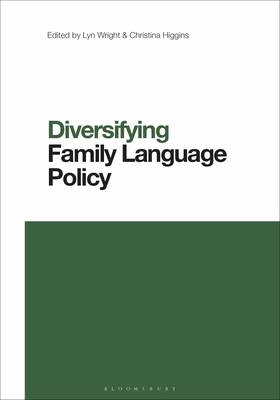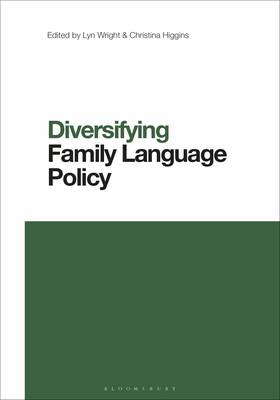
Bedankt voor het vertrouwen het afgelopen jaar! Om jou te bedanken bieden we GRATIS verzending (in België) aan op alles gedurende de hele maand januari.
- Afhalen na 1 uur in een winkel met voorraad
- In januari gratis thuislevering in België
- Ruim aanbod met 7 miljoen producten
Bedankt voor het vertrouwen het afgelopen jaar! Om jou te bedanken bieden we GRATIS verzending (in België) aan op alles gedurende de hele maand januari.
- Afhalen na 1 uur in een winkel met voorraad
- In januari gratis thuislevering in België
- Ruim aanbod met 7 miljoen producten
Zoeken
Diversifying Family Language Policy
€ 93,45
+ 186 punten
Omschrijving
An increasingly important field of research within multilingualism and sociolinguistics, Family Language Policy (FLP) investigates the explicit and overt planning of language use within the home and among family members. However the diverse range of different family units and contexts around the globe necessitates a similarly diverse range of research perspectives which are not yet represented within the field.
Tackling this problem head on, this volume expands the scope of families in FLP research. Bringing together contributors and case studies from every continent, this essential reference broadens lines of inquiry by investigating language practices and ideologies in previously under-researched families. Seeking to better reflect contemporary influences on FLP processes, chapters use innovative methodologies, including digital ethnographies and autoethnography, to explore diverse family configurations (adoptive, LGBTQ+, and single parent), modalities (digital communication and signed languages), and speakers and contexts (adult learners, Indigenous contexts, and new speakers).
Bringing to light the dynamic, fluid nature of family and kinship as well as the important role that multilingualism plays in family members' negotiation of power, agency, and identity construction, Diversifying Family Language Policy is a state-of-the-art reference to contemporary theoretical, methodological and ethical advances in the field of family language policy.
Tackling this problem head on, this volume expands the scope of families in FLP research. Bringing together contributors and case studies from every continent, this essential reference broadens lines of inquiry by investigating language practices and ideologies in previously under-researched families. Seeking to better reflect contemporary influences on FLP processes, chapters use innovative methodologies, including digital ethnographies and autoethnography, to explore diverse family configurations (adoptive, LGBTQ+, and single parent), modalities (digital communication and signed languages), and speakers and contexts (adult learners, Indigenous contexts, and new speakers).
Bringing to light the dynamic, fluid nature of family and kinship as well as the important role that multilingualism plays in family members' negotiation of power, agency, and identity construction, Diversifying Family Language Policy is a state-of-the-art reference to contemporary theoretical, methodological and ethical advances in the field of family language policy.
Specificaties
Betrokkenen
- Uitgeverij:
Inhoud
- Aantal bladzijden:
- 338
- Taal:
- Engels
- Reeks:
Eigenschappen
- Productcode (EAN):
- 9781350247260
- Verschijningsdatum:
- 25/01/2024
- Uitvoering:
- Paperback
- Formaat:
- Trade paperback (VS)
- Afmetingen:
- 170 mm x 244 mm
- Gewicht:
- 539 g

Alleen bij Standaard Boekhandel
+ 186 punten op je klantenkaart van Standaard Boekhandel
Beoordelingen
We publiceren alleen reviews die voldoen aan de voorwaarden voor reviews. Bekijk onze voorwaarden voor reviews.








